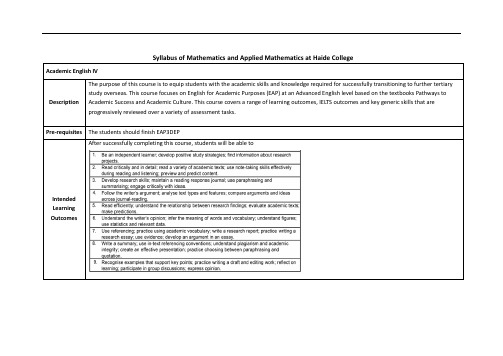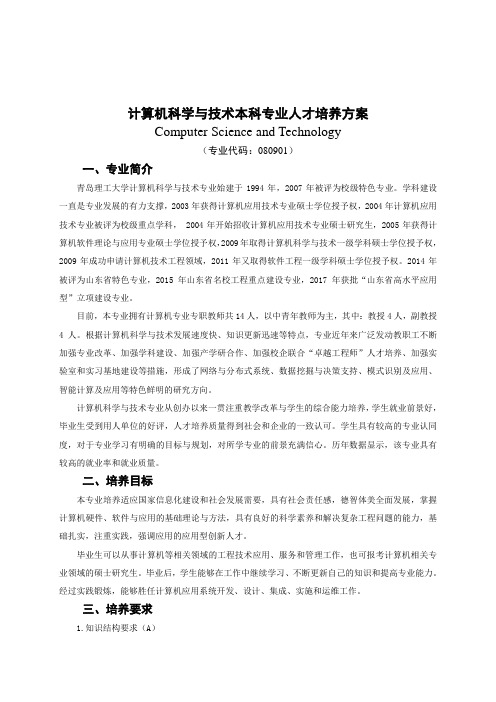学科英语A理工类AcademicEnglishforScienceandEngineering
机械工程专业英语

机械工程专业英语课程负责人:课程中文名称:专业英语课程英文名称:English for Mechanical Engineering课程类别:选修课程学分数:2课程学时数:32授课对象:机械电子工程专业本科生本课程的前导课程:公共英语,机械专业的相关课程考核方式:平时成绩+期末考试使用教材:《机械工程专业英语教程》施平主编(第3版)电子工业大学出版社教学要求及目的:了解专业英语的语法特点,熟悉专业词汇,逐步培养学生具有比较熟练的专业文献阅读理解能力、翻译能力和英文学术论文的写作能力。
教学方式:课堂讲授、讨论与自学相结合。
以教师讲授为主,引导学生积极阅读指定参考文献,完成课外作业,参与课堂讨论。
有意识地积累与自己研究方向相关的词汇与文献资料,掌握专业英语学习方法。
具体教学目标:●掌握机械工程专业方面的专业名词、专业术语rolling contact bearing, 滚动接触轴承journal bearing, 径向轴承resonance 共振upright drilling machine 立式钻床radial ['reɪdɪəl]drill 摇臂钻床shaper 牛头钻床●掌握习惯表达方式machine design,kinematics [,kɪnɪ'mætɪks] 运动学,动力学dynamic 动态slider-crank mechanism ['mek(ə)nɪz(ə)m] 滑动曲柄机构,assembly drawing 装配图detailed [dɪ'teld]drawing 明细图engineering drawing 工程图degree-of-freedom (DOF) 自由度a four-bar mechanism 四连杆机构vibration mechanism 振动机构CAD Computer - Aided Design, CAM computer-aided manufacturingCAE Computer Aided Engineering●掌握基本的专业文献阅读能力与翻译能力●掌握基本的写作能力●培养基本的专业文献资料检索能力●了解机械工程方面的国内外动向, 并熟悉与机械工程专业相关的其他学科与知识Lesson 1 Translation Skill of Subject-Based English ESP(专门用途英语即专业英语)——English For Specific [spə'sɪfɪk] PurposesEST(科技英语)——English for Science and TechnologyEBE(商业经济英语)——English for Business and EconomicsESS(社会科学英语)——English for Social ScienceEAP(学术英语)——English for Academic PurposesEOP(职业英语)——English for Occupational PurposesESP的语法特点:●名词化●被动语态(1)名词化:The rocket has been developed. For this reason, man can enter space.The development of the rocket makes it possible for man to enter space.随着火箭技术的进步,人类进入太空成为可能。
学术英语IV-Academic English IV

Words with silent & weak letters
Interview
Role play
Speaking Test (individual assessment – a part of End of Semester (EOS) exams
Week 13
Cloudcampus Week 13
Short answers
Sentences
IELTS reading strategies
Reading comprehension
Synonyms
Adjectives
Week 8
Cloudcampus Week 8
Pre & Post activities.
Pathways to Academic
Group and pair discussion
Critical reading
Avoiding plagiarism
Ongoing: Attendance (5%)
Participation in class & homework (10%)
Participation on Cloudcampus (10%)
Group and pair discussion
Speaking in a tutorial
Short answers
Writing (agree/disagree)
Week 11
Cloudcampus Week 11
Pre & Post activities.
Pathways to Academic
Pathways to Academic
学术英语写作EnglishAcademicWriting-青岛理工大学教务处

计算机科学与技术本科专业人才培养方案Computer Science and Technology(专业代码:080901)一、专业简介青岛理工大学计算机科学与技术专业始建于1994年,2007年被评为校级特色专业。
学科建设一直是专业发展的有力支撑,2003年获得计算机应用技术专业硕士学位授予权,2004年计算机应用技术专业被评为校级重点学科, 2004年开始招收计算机应用技术专业硕士研究生,2005年获得计算机软件理论与应用专业硕士学位授予权,2009年取得计算机科学与技术一级学科硕士学位授予权,2009年成功申请计算机技术工程领域,2011年又取得软件工程一级学科硕士学位授予权。
2014年被评为山东省特色专业,2015年山东省名校工程重点建设专业,2017年获批“山东省高水平应用型”立项建设专业。
目前,本专业拥有计算机专业专职教师共14人,以中青年教师为主,其中:教授4人,副教授4人。
根据计算机科学与技术发展速度快、知识更新迅速等特点,专业近年来广泛发动教职工不断加强专业改革、加强学科建设、加强产学研合作、加强校企联合“卓越工程师”人才培养、加强实验室和实习基地建设等措施,形成了网络与分布式系统、数据挖掘与决策支持、模式识别及应用、智能计算及应用等特色鲜明的研究方向。
计算机科学与技术专业从创办以来一贯注重教学改革与学生的综合能力培养,学生就业前景好,毕业生受到用人单位的好评,人才培养质量得到社会和企业的一致认可。
学生具有较高的专业认同度,对于专业学习有明确的目标与规划,对所学专业的前景充满信心。
历年数据显示,该专业具有较高的就业率和就业质量。
二、培养目标本专业培养适应国家信息化建设和社会发展需要,具有社会责任感,德智体美全面发展,掌握计算机硬件、软件与应用的基础理论与方法,具有良好的科学素养和解决复杂工程问题的能力,基础扎实,注重实践,强调应用的应用型创新人才。
毕业生可以从事计算机等相关领域的工程技术应用、服务和管理工作,也可报考计算机相关专业领域的硕士研究生。
各个学科名字的英文单词

各个学科名字的英文单词各个学科名字的英文单词每一门学科的名字都有属于它的英文单词,为此店铺为大家带来各个学科名字的英文单词。
学科名的英文单词Chinese 语文English 英语Japanese 日语history 历史mathematics 数学physical education 体育algebra 代数geometry 几何geography 地理biology 生物chemistry 化学physics 物理literature 文学psychology 心理学sociology 社会学philosophy 哲学engineering 工程学mechanical engineering 机械工程学electronics 电子学medicine 医学social science 社会学agriculture 农学astronomy 天文学economics 经济学politics 政治学biochemistry 生物化学anthropology 人类学linguistics 语言学accounting 会计学law 法学metallurgy 冶金学finance 财政学,金融学journalism 新闻学civil engineering 土木工程学architecture 建筑学business administration 工商管理学chemical engineering 化学工程学botany 植物学学科的英文例句计算机科学目前已是一门成熟的.学科。
Computer science is now a fully-fledged academic subject.他熟悉这一学科。
He is at home with this subject.她已全面掌握了这一学科。
She has a comprehensive grasp of the subject.但愿我能精通这门学科就好了。
学术英语(社科)-Unit-3含答案

2 Word Families and
Collocations
词族和搭配。
4 Strategies
学习学术词汇的策略。
Critical Thinking
Definition
批判性思维的定义。
Distinguishing Fact from Opinion
区分事实和观点。
Importance
引用和改写的方法。
Academic Integrity
1 Definition
学术诚信的定义。
3 Types of Academic
Misconduct
学术不端行为的类型。
2 Importance
学术诚信在社会科学中的重要性。
4 Prevention Strategies
预防学术不端行为的策略。
Conclusion
Speaking and Listening
1
Characteristics of
Academic Speaking
Participation in Academic
2
社会科学学术演讲的特点。
Discussions
参与学术讨论和研讨会的技巧。
3
Effective Listening
有效听力的策略。
1 Summary of Key Points
关键要点总结。
3 Resources
进一步学习的资源。
2 Future Directions
提高社会科学学术英语能力的未来方向。
4 Evaluation
对本单元的评估。
批判性思维在社会科学中的重要性。
Evaluating Sources
通用学术英语视听说

通用学术英语视听说Academic English is the cornerstone for effective communication in scholarly pursuits. It is the language of textbooks, lectures, and research papers, bridging the gap between diverse academic disciplines.Listening to academic lectures requires a keen ear for specialized vocabulary and the ability to follow complex arguments. It's about more than just hearing the words; it's about understanding the underlying concepts and the nuances of academic discourse.Speaking in an academic setting demands clarity and precision. It's about articulating thoughts in a structured manner, supporting arguments with evidence, and engaging in meaningful dialogue with peers and professors.Reading academic texts is a skill that involves critical analysis and the ability to synthesize information from various sources. It's not just about comprehension, but also about evaluating the credibility and relevance of the material.Writing in an academic context is a craft that requires a mastery of formal language, logical structuring of ideas, and adherence to citation protocols. It's about presenting information in a way that is both persuasive and informative.Mastering the skills of listening, speaking, reading, and writing in academic English is essential for success in higher education and professional development. It empowers students to engage with a global community of scholars and to contribute meaningfully to their fields of study.To excel in academic English, one must immerse themselves in the language, practice regularly, and seek feedback from proficient speakers. It's a journey of continuous learning and improvement, where each step forward enhances the ability to communicate complex ideas with clarity and confidence.。
教育学专业词汇英语
教育专业词汇的英语翻译人才枯竭exhaustion of human resources辍/失学青少年school dropout/leaver基金会foundation服务性行业service trade在职培训on-the-job/in-service training基础科学the fundamentals学分制the credit system三学期制the trimester system税收tax revenue多学科的multi-disciplinary重点大学key university授予(学士)confer被授权be authorized to do专业specialty爱国人士patriotic personage国家教育经费national expenditure on education财政拨款financial allocation毕业论文thesis; dissertation毕业实习graduation field work毕业设计graduation design毕业典礼graduation ceremony; commencement毕业证书diploma; graduation certificate博士生导师Ph.D advisor; doctoral advisor(supervisor)授予某人学位to confer a degree on sb.升级to be promoted to a higher grade留级to repeat the year‘s work; to stay down补考make-up examination升学t o go to a school of a higher grade; to enter a higher school升学率proportion of students entering schools of a higher grade奖学金scholarship(国家)助学金(state)stipend/subsidy领取助学金的学生a grant-aided student学费tuition (fee)占百分比account for ...%专任教师full-time teacher国际文化交流intercultural communication教育方针guideline(s)/guiding principle(s) for education教育必须为社会主义现代化服务,必须同生产劳动相结合,培养德智体全面发展的建设者和接班人。
学科大类课 务英文
学科大类课务英文English: In today's globalized world, proficiency in English is not just a valuable skill but a necessity, particularly in academic settings. English for Academic Purposes (EAP) courses are designed to equip students with the language skills needed to succeed in higher education. These courses typically focus on developing proficiency in academic writing, reading, listening, and speaking, as well as critical thinking and research skills. In EAP classes, students learn how to effectively structure essays, present arguments coherently, and engage with complex academic texts. Moreover, they acquire the ability to participate actively in discussions, seminars, and presentations, essential components of academic life. Through exposure to various academic disciplines, students broaden their vocabulary and deepen their understanding of subject-specific terminology. Additionally, EAP courses often integrate digital literacy skills, teaching students how to navigate online resources, evaluate sources, and incorporate technology into their academic work. Ultimately, English for Academic Purposes courses not only enhance students' language proficiency but also empower them to thrive inthe academic environment, preparing them for success in their chosen fields of study.中文翻译: 在当今全球化的世界中,英语的熟练程度不仅仅是一项宝贵的技能,更是一种必需,特别是在学术环境中。
各个学科名字的英文单词
各个学科名字的英文单词学科名的`英文单词Chinese 语文English 英语Japanese 日语history 历史mathematics 数学physical education 体育algebra 代数geometry 几何geography 地理biology 生物chemistry 化学physics 物理literature 文学psychology 心理学sociology 社会学philosophy 哲学engineering 工程学mechanical engineering 机械工程学electronics 电子学medicine 医学social science 社会学agriculture 农学astronomy 天文学economics 经济学politics 政治学biochemistry 生物化学anthropology 人类学linguistics 语言学accounting 会计学law 法学metallurgy 冶金学finance 财政学,金融学journalism 新闻学civil engineering 土木工程学architecture 建筑学business administration 工商管理学chemical engineering 化学工程学botany 植物学学科的英文例句计算机科学目前已是一门成熟的学科。
Computer science is now a fully-fledged academic subject. 他熟悉这一学科。
He is at home with this subject.她已全面掌握了这一学科。
She has a comprehensive grasp of the subject.但愿我能精通这门学科就好了。
I wish I could be a master of this subject.她的讲座将该学科的新发展全部包罗在内。
英语是一个很重要的学科英语作文
英语是一个很重要的学科英语作文English is a very important subject for students to learn. It is one of the most widely spoken languages in the world and is considered the international language of communication. Learning English opens up a world of opportunities for individuals, both in terms of their education and their future careers.Firstly, English is a crucial subject for students to learn in school because it is the language of instruction for many academic subjects. In order to excel in subjects such as science, mathematics, and social studies, students must have a strong grasp of English. Without a good understanding of the language, students may struggle to understand the material being taught and may fall behind in their studies.Furthermore, English is also important for students who are looking to further their education beyond high school. Many universities and colleges around the world require students to have a certain level of proficiency in English in order to be admitted to their programs. For students who are looking to study abroad, having a good command of English is essential in order to communicate effectively with professors and fellow students.In addition to its importance in the academic realm, English is also a key factor in securing employment in today's global economy. Many multinational companies require their employees to be fluent in English in order to communicate with clients and colleagues from around the world. In fact, in many industries, including business, technology, and tourism, having strong English skills can be a deciding factor in whether or not a candidate is hired for a job.Moreover, English is also the language of the internet and is used widely in the fields of entertainment, media, and pop culture. In order to stay informed and connected in today's interconnected world, individuals must be able to understand and navigate English-language websites, social media platforms, and news sources.In conclusion, English is a very important subject for students to learn. It is not just a language, but a key to unlocking a world of opportunities and possibilities. By mastering English, students can improve their academic performance, increase their chances of getting into a good university, and enhance their prospects for a successful career. Therefore, it is essential for students to take their English studies seriously and strive to improve their proficiency in the language.。
- 1、下载文档前请自行甄别文档内容的完整性,平台不提供额外的编辑、内容补充、找答案等附加服务。
- 2、"仅部分预览"的文档,不可在线预览部分如存在完整性等问题,可反馈申请退款(可完整预览的文档不适用该条件!)。
- 3、如文档侵犯您的权益,请联系客服反馈,我们会尽快为您处理(人工客服工作时间:9:00-18:30)。
学科英语A(理工类)
Academic English for Science and Engineering
课程代码:10310024 适用层次:本科A班总学时:48
理论学时:32实验(或上机)学时:学分:2
一、教学目的与要求:
本课程主要培养学生有效、得体地使用英语进行理工学科专业的学业学习与进行口头和书面形式的学术交流的能力。
通过从国外原版教材、期刊、杂志中精选真实、难度适中的阅读材料,提供与理工学科专业相关的讲座、访谈等音视频材料作为听说训练,并针对学术写作各环节循序渐进训练学生写作技巧,利用科学合理的教学活动设计,多角度拓展学生视野,多层面综合提升学生的学术英语语言能力和思辨创新能力,同时通过基于任务的教学模式培养团队合作和探究精神。
教师的授课要求:
可采用课堂讲授,课堂讨论,习题课等进行课堂教学;采用电子教案、幻灯片等形式加强教学效果;每单元布置3~5道习题以巩固教学内容;安排1~3次专题讨论课以使理论与实际相结合。
二、课程简介
本课程是理工类专业本科生必修的一门公共基础课程,是大学基础英语和英语技能训练课程的后续课程,是把学生的基础英语能力转化成专业英语应用能力的衔接类英文课程,对学生的专业英语应用能力的形成有着不可忽视的作用,在整个大学英语教学体系中占据非常重要的地位。
学科英语(理工类)是大学基础英语和专业英语之间的过渡课程,学生通过本课程的学习,训练专业相关的英语听、说、读、写、译能力,具备专业方面的英语交流能力。
本课程教学是在理工各学科背景下,以英语语言知识与应用技能(包括听、说、读、写、译的技能)、学习策略和跨文化交际为主要内容,着重培养学生在专业方面的英语理解和交流能力,兼顾专业知识和外语教学方法和手段的一个综合教学体系。
三、教学内容及学时安排
第一单元绪论(2学时)
1.了解:科技文体的风格
2.理解:科技文体的特点
3.掌握:科技文体的基本要求
第二单元论文选题(5学时)
1.了解:项目选题的要求
2.理解:研究性假设与Toulmin模型
3.掌握:如何暂定研究选题,写工作底稿
第三单元收集整理信息(5学时)
1.了解:文献检索的方法和意义
2.理解:搜索引擎技术和关键词索引原理,语义场
3.掌握:搜读与略读的技巧,批判性阅读的基础,书面摘要的方法
第四单元听学术报告(5学时)
1.了解:学术组织与学术会议
2.理解:口头报告与书面论文的异同,公开演说的范式
3.掌握:听写记录与摘要的方法
第五单元文献综述(5学时)
1.了解:文献综述的意义和要求
2.理解:理论架构,情态与模糊表达,引证方法与范式
3.掌握:衔接与连贯,引用和摘录的恰当方法,如何避免剽窃与侵权
第六单元学术论文写作与提高(5学时)
1.了解:学术论文与文学散文的异同
2.理解:原创性研究论文与次生研究论文的比较
3.掌握:论文主体、结语、参考书目、引言和摘要的编写与修改
第七单元参加学术交流(5学时)
1.了解:学术会议日程安排
2.理解:跨文化交际,非言语交际,语境
3.掌握:口头报告的叙事方法,口头禅与常用的程式化表达
四、学时分配
序号课程内容学时数学时合计
1 绪论 2
2 论文选题 5
32
3 收集整理信息 5
4 听学术报告 5
5 文献综述 5
6 学术论文写作与提高 5
7 参加学术交流 5
五、执行大纲的几点说明
1、先修课程:大学基础英语AI、大学基础英语AII
2、后继课程:语言拓展课程
3、选用教材:学术英语(理工),蔡基刚主编,外语教学与研究出版社。
4、主要参考书目:
[1]《大学专门用途英语》改编组,《大学专门用途英语系列教材》,高等教育出版社。
[2] 刘爱军,王斌,《科技英语综合教程: 专业英语类》,外语教学与研究出版社。
[3] 季佩英,范烨,《学术英语(综合)》,外语教学与研究出版社。
[4] 汪永明,《机械专业英语》,中国科学技术大学出版社。
[5] 叶邦彦,陈统坚,《机械工程英语》,机械工业出版社。
执笔人:曾令宙审稿人:。
